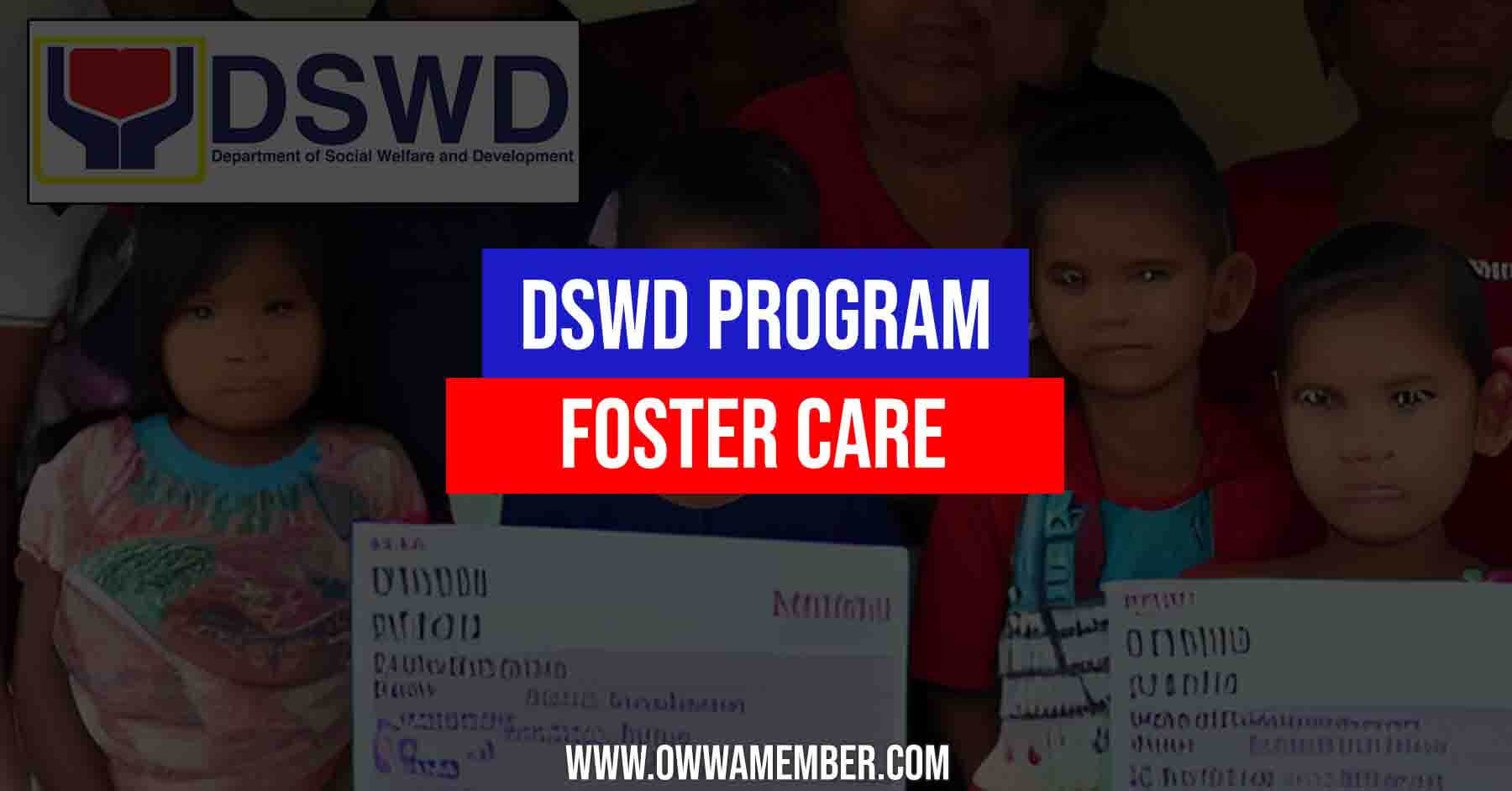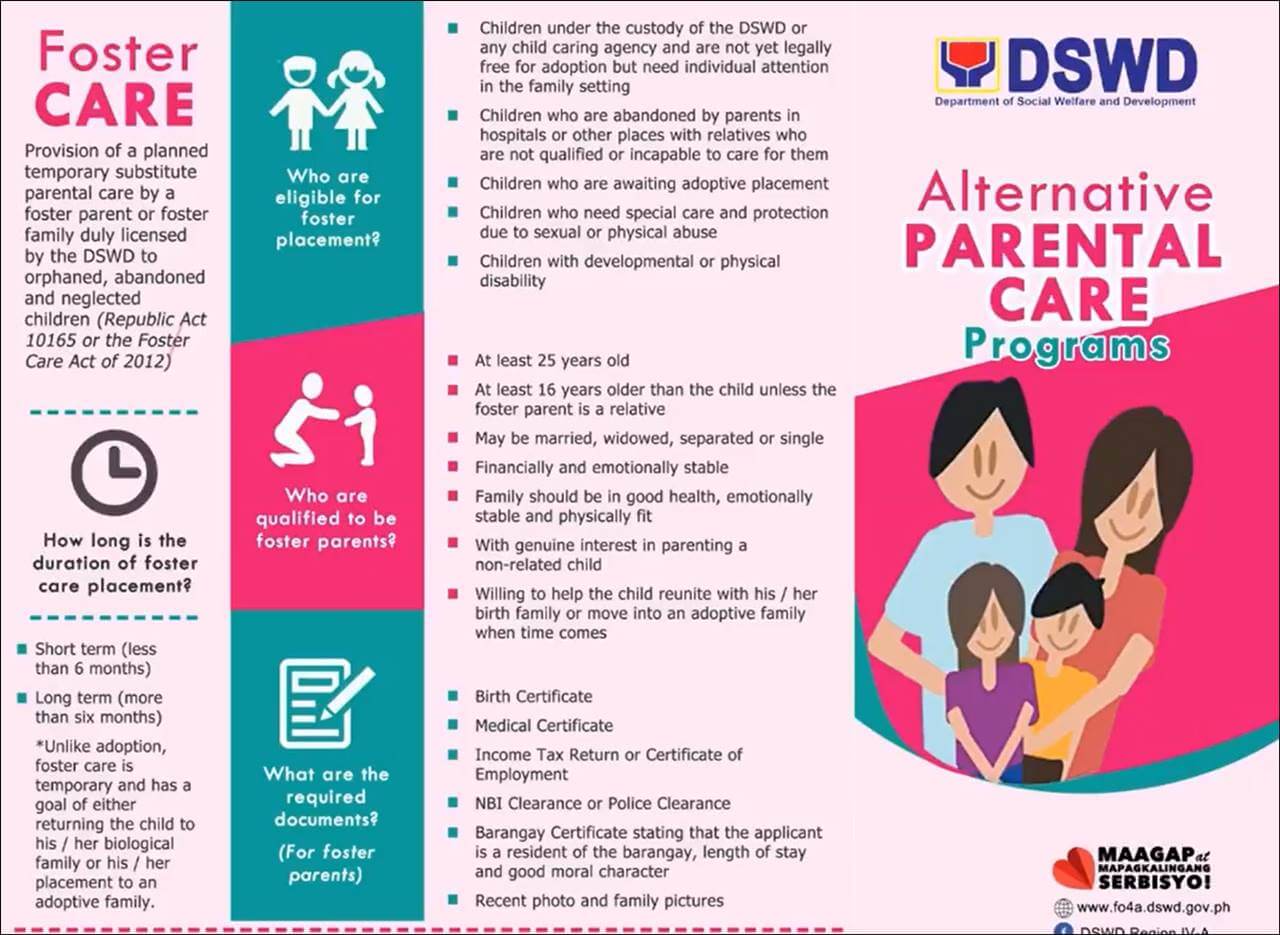The DSWD Foster Care Program provides temporary care to children who are not able to live with their families due to various reasons. The program seeks to provide a family environment for the child, where he or she can be given love and care, and eventually be reunified with his or her family. Currently, the DSWD is looking for families who are willing to open their homes and hearts to these children.
Also Read: DSWD Adoption Program: Requirements and Process
The Department of Social Welfare and Development (DSWD) is mandated by the Foster Care Act of 2012 to provide temporary care and rehabilitation for children who are victims of abuse, exploitation, cruelty, abandonment, or neglect. The program also aims to place these children in families that can provide them with a more nurturing and stable environment.
In this post, we’ll discuss some of the benefits of the DSWD Foster Care Program, as well as how to apply. If you’re considering applying, please check out the guidelines below:
Contents
- How The DSWD Foster Care Program Works
- Benefits For Foster Parents
- Benefits for Children In Foster Care
- How Long The Foster Child Is Provided With A Monthly Foster Care Subsidy?
- What are the Requirements of the DSWD Foster Care Program?
- Video: How To Be A Foster Parent In The Philippines
- Frequently Asked Questions
- Summary

How The DSWD Foster Care Program Works
Under this program, fostered children are placed under the care of appointed foster parents by the Court. The objective of the program is to provide a family-like setting for the child while his or her case is being resolved by the Court.
There are two types of foster care arrangements: kinship care and non-kinship care. In kinship care, the foster parent is related to the child by blood, while in non-kinship care, the foster parent is not related to the child by blood.
The child remains under DSWD custody even if he or she is placed under foster care. The foster parents will have custody over the child until the court decides to terminate parental rights, or until the child reaches 18 years old whichever comes first.
Adoption, on the other hand, is a legal process whereby parental rights and responsibilities are transferred from one person to another. Adoption permanently severs all legal ties between a birth parent and his or her child.
The first step in the foster care process is to make a referral to the Department of Social Welfare and Development (DSWD). Referrals can be made by anyone who is concerned about the welfare of a child, including but not limited to family members, friends, teachers, healthcare professionals, and law enforcement officials.
Also Read: List of DSWD Programs and Services for Filipinos
Once a referral has been made, a social worker will conduct an initial assessment to determine if the child meets the criteria for placement in foster care. If the child is deemed eligible for placement, the social worker will work with the child’s biological parents or legal guardians to develop a plan of care. This plan will detail the child’s needs and how they will be met while in foster care.
The next step is to identify a suitable foster care placement. The social worker will work with the child’s biological parents or legal guardians to identify a relative or close family friend who can provide a temporary home for the child. If no suitable placements are identified, the social worker will work with an approved foster care agency to identify a foster home that meets the child’s needs.
Once a placement has been identified, the social worker will complete a home study to ensure that the home is safe and appropriate for the child. Once the home study has been completed and all necessary approvals have been obtained, the child will be placed in their new foster home.
The final step in the process is to monitor the child’s progress while in foster care. The social worker will conduct regular visits with the child and their foster family to ensure that everyone is adjusting well and that all of the child’s needs are being met. The goal of these visits is to provide support and ensure that everyone involved in the foster care arrangement is thriving.
Benefits For Foster Parents
Foster parents who are registered with the DSWD can avail of a monthly stipend, educational assistance, and health insurance for their foster children. They can also receive training and guidance from social workers on how to take care of their foster children’s physical, emotional, and psychological needs.
Becoming a foster parent also has intangible benefits. It gives you the opportunity to make a difference in a child’s life and to help them heal from trauma. It also allows you to expand your family in a unique way.
Benefits for Children In Foster Care
Children in foster care can avail of the same benefits as their foster parents, including a monthly stipend, educational assistance, and health insurance. They also have access to social workers who can help them deal with any emotional or psychological issues they may be facing.
In addition, being in foster care can help children develop important life skills such as empathy, patience, communication, and problem-solving. And because they are living in a stable and loving home environment, they are more likely to thrive academically and socially than children who are not in foster care.
How Long The Foster Child Is Provided With A Monthly Foster Care Subsidy?
The amount of the subsidy is based on the age of the child and ranges from P8000 to P10,000 per month. The subsidy is given directly to the foster parent or relative caregiver and is intended to help cover basic needs such as food, clothing, and education.
Foster care subsidies are provided until the child reaches 18 years of age or until he or she is discharged from foster care due to certain circumstances, such as reaching majority age, marriage, emancipation, or adoption. In cases where the child has special needs, subsidies may be extended until he or she reaches 21 years of age.
To avail of this subsidy, interested individuals must first undergo screening procedures to ensure that they meet all the requirements set by DSWD. These requirements include being at least 21 years old, having no history of abuse or neglect, being a Filipino citizen, and passing criminal background checks.

What are the Requirements of the DSWD Foster Care Program?
If you are interested in becoming a foster parent in the Philippines, you will need to go through the Department of Social Welfare and Development (DSWD). The first step is to attend a seminar that will introduce you to the program and what is expected of foster parents. After the seminar, you will need to submit an application form along with the following documents:
- A certified true copy of your birth certificate from the Philippine Statistics Authority
- A Barangay Certificate or Police Clearance
- A medical certificate from a licensed physician
- Certificates of marriage, if applicable
- Income tax return for the past three years
- Certificate of employment or business registration, if self-employed
- Proof of residency such as a utility bill
- NBI clearance
- ACE clearance from the Bureau of Immigration
- Child abuse prevention seminar certificate
- Home study report conducted by a licensed social worker
Once your application has been approved, you will be contacted by the DSWD to schedule an interview. After the interview, you will be required to attend a child abuse prevention seminar. Once you have completed all of the requirements, you will be placed on a waiting list until a child is available for placement in your home.
Video: How To Be A Foster Parent In The Philippines
This video is all about how to be a foster parent in the Philippines. It outlines the process of becoming a foster parent, from initial application to final placement of a child. The video also provides an overview of the types of foster children available for placement and the benefits of fostering a child.
Frequently Asked Questions
1. Do Foster Parents Get Paid In The Philippines?
No, foster parents in the Philippines do not get paid. They volunteer their time and resources to provide a loving home for children who have been abandoned, abused, or orphaned. Foster parents undergo training and must be registered with the Department of Social Welfare and Development.
2. What Means Foster Care?
Foster care is a volunteer-based program that provides temporary homes for children who have been removed from their families due to abuse or neglect. The goal of foster care is to provide a safe and nurturing environment for children until they can be reunited with their families or placed in permanent homes.
Foster parents undergo extensive training and background checks before being approved to participate in the program. They also receive on-going support from social workers and other professionals.
3. What Is Adoption And Foster Care DSWD?
Adoption and foster care are two different ways to provide a family for a child who cannot live with their birth parents. Adoption is a legal process whereby the adoptive parents assume all the rights and responsibilities of the child’s birth parents.
Foster care is a temporary arrangement whereby the child is placed with volunteer foster parents who provide care and support until the child can be returned to their birth parents or placed for adoption. The Department of Social Welfare and Development (DSWD) is responsible for managing adoptions and foster care placements in the Philippines.
4. How Long Is The Typical Foster Care Placement?
There is no set time limit for foster care placements, but they are typically temporary. The goal is to provide a safe and nurturing environment for the child until they can be reunited with their birth parents or placed in a permanent home.
5. Are There Different Types Of Foster Children?
Yes, there are different types of foster children available for placement. They include:-Children who have been removed from their families due to abuse or neglect-Orphaned children-Children with special needs-Children who are HIV positive
6. What Are The Benefits Of Becoming A Foster Parent?
There are many benefits to becoming a foster parent, including: Making a difference in the life of a child, Receiving training and support, The opportunity to provide a loving home for a child who needs it, The chance to make a difference in a child’s life.
7. How Do I Become A Foster Parent In The Philippines?
If you’re interested in becoming a foster parent in the Philippines, the first step is to contact the Department of Social Welfare and Development (DSWD). They will provide you with information about the program and the requirements for participation.
To be eligible to become a foster parent in the Philippines, you must: Be at least 21 years old, Be a Filipino citizen or a permanent resident alien, Undergo an interview and background check, Complete a child abuse prevention seminar, Have a clean criminal record.
Summary
The Department of Social Welfare and Development or DSWD has opened up its foster care program to help raise children who have been abandoned, neglected, or abused. This is a great opportunity for those who want to make a difference in a child’s life as well as their own.
The process of becoming a foster parent is not an easy one, but it is definitely worth it. If you are interested in learning more about this program or becoming a foster parent, please visit the DSWD website or contact your nearest social welfare office.